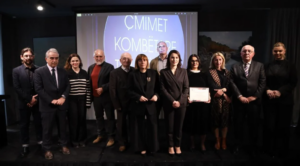
© https://www.hashtag.al/
У Тирані вручили Національні літературні премії Албанії за найкращі твори 2023 року. Захід, організований Національним центром книги та читання, став важливою подією в культурному житті країни, підкресливши розмаїття сучасного літературного процесу — від політичної утопії до дитячої прози, від історичних досліджень до тонкої поезії. Лауреати стали:
Беснік Мустафай (нар. 1958) — за роман Fate
Один із найвідоміших албанських письменників і дипломатів здобув головну літературну нагороду за сміливу спробу уявити альтернативний хід історії. У романі Fate Албанія постає як можливий засновник ЄС та НАТО ще у 1878 році. Цей витончений політичний експеримент Мустафай наповнює емоційними образами вразливих героїв і сильною жіночою присутністю.
Пеллумб Джуфі (нар. 1951) — за історичне дослідження Albania and the Desperate End of the Century. Відомий історик і колишній дипломат відзначений за фундаментальну працю, присвячену середньовічному періоду албанської історії. Книга ґрунтується на унікальних архівних джерелах і вперше систематизує зусилля албанців вижити як народ у добу великих потрясінь. Журі оцінило її як «внесок у національну історіографію і глибоку реконструкцію темних сторінок минулого».
Шпетим Келменді (нар. 1976) — за збірку оповідань Dashnia asht, журналіст і прозаїк Келменді отримав нагороду за тонке літературне занурення у «найінтимніші простори нашого внутрішнього світу». Його новели поєднують емоційну глибину, метафоричність та роздуми про кохання, самотність і тишу. Твір дарує читачам «літературний досвід, який пробуджує чуття і запрошує до медитації».
Ентела Табаку (нар. 1971) — за поетичну збірку, авторка збагачує албанську поезію. Збірка відзначена за «поетичну глибину, образну силу та інтелектуальну елегантність».
Ана Кове (нар. 1968) — за переклад роману Ґюнтера Ґрасса «Бляшаний барабан». Перекладачка і літературознавиця отримала відзнаку за високохудожній переклад німецького класика.
Ледьяна Брахос (1998) — за дитячу книгу Kroni e Pëlübardhat. Молода авторка привернула увагу сміливою розмовою з юними читачами на сучасні теми. Її книга, написана від першої особи, охоплює шлях дитини — від перших вражень до відкриття світу. Оповідь вирізняється стилістичною чистотою, глибиною психологічного підходу та емпатією.
Announcing the Winners of the Albanian National Literary Awards – 2025
In Tirana, the Albanian National Literary Awards for the best works of 2023 were presented. The event, organized by the National Book and Reading Center, became a significant cultural occasion, highlighting the diversity of the contemporary literary scene — from political utopia to children’s prose, from historical research to delicate poetry. The winners are:
Besnik Mustafaj (b. 1958) — for the novel Fate
One of the most renowned Albanian writers and diplomats received the top literary prize for a bold attempt to imagine an alternative course of history. In Fate, Albania is portrayed as a possible founder of the EU and NATO as early as 1878. This refined political experiment is filled with emotional images of vulnerable characters and a strong feminine presence.
Pëllumb Xhufi (b. 1951) — for the historical study Albania and the Desperate End of the Century
A well-known historian and former diplomat was honored for a fundamental work dedicated to the medieval period of Albanian history. The book is based on unique archival sources and systematically documents for the first time the Albanian people’s efforts to survive as a nation during times of great upheaval. The jury praised it as “a contribution to national historiography and a profound reconstruction of the dark chapters of the past.”
Shpëtim Kelmendi (b. 1976) — for the short story collection Dashnia asht
Journalist and prose writer Kelmendi was awarded for his delicate literary exploration of “the most intimate spaces of our inner world.” His stories combine emotional depth, metaphorical language, and reflections on love, loneliness, and silence. The work offers readers “a literary experience that awakens the senses and invites meditation.”
Entela Tabaku (b. 1971) — for a poetry collection
The poet enriches Albanian poetry. Her collection was recognized for its “poetic depth, vivid imagery, and intellectual elegance.”
Ana Kove (b. 1968) — for the translation of Günter Grass’s novel The Tin Drum
The translator and literary scholar was awarded for a highly artistic translation of the German classic.
Ledjana Brahos (b. 1998) — for the children’s book Kroni e Pëlübardhat
The young author attracted attention for her courageous dialogue with young readers on contemporary topics. Her book, written in the first person, covers the journey of a child — from first impressions to discovering the world. The narrative stands out for its stylistic purity, psychological depth, and empathy.
@https://24-ore.com/

©
787